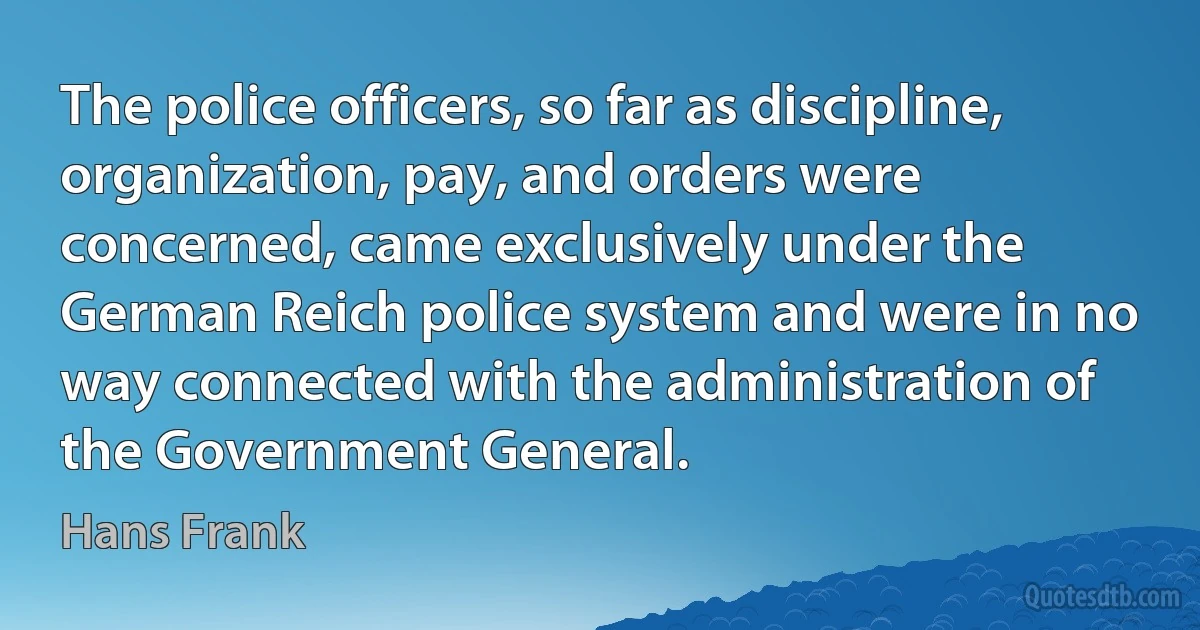Discipline Quotes - page 40
In our time of ever-increasing specialization, there is a tendency to concern ourselves with relatively narrow scientific problems. The broad foundations of our present-day scientific knowledge and its historical development tend to be forgotten too often. This is an unfortunate trend, not only because our horizon becomes rather limited and our perspective somewhat distorted, but also because there are many valuable lessons to be learned in looking back over the years during which the basic concepts and the fundamental laws of a particular scientific discipline were first formulated.

Emil Wolf
Communism is oppression and slavery. Man is very willing to obey the law of duty, serve his country, and oblige his friends; but he wishes to labor when he pleases, where he pleases, and as much as he pleases. He wishes to dispose of his own time, to be governed only by necessity, to choose his friendships, his recreation, and his discipline; to act from judgment, not by command; to sacrifice himself through selfishness, not through servile obligation. Communism is essentially opposed to the free exercise of our faculties, to our noblest desires, to our deepest feelings.

Pierre-Joseph Proudhon
Within the ranks of the people, democracy is correlative with centralism and freedom with discipline. They are the two opposites of a single entity, contradictory as well as united, and we should not one-sidedly emphasize one to the denial of the other. Within the ranks of the people, we cannot do without freedom, nor can we do without discipline; we cannot do without democracy, nor can we do without centralism. This unity of democracy and centralism, of freedom and discipline, constitutes our democratic centralism. Under this system, the people enjoy extensive democracy and freedom, but at the same time they have to keep within the bounds of socialist discipline.

Mao Zedong
Money talks: financing the periphery buys Berlin a leading role recasting the eurozone governance framework. The recent ‘six pack' of legislative reforms hints at what's to come: institutionalized fiscal discipline and an excessive imbalances procedure that protects against future moral hazard. The whole eurozone will tilt toward the German surplus model as we get more fiscal integration and more German leverage.

Ian Bremmer
All this calls for an attitudinal change in the Church. An inward looking Church gives undue importance to rite and rubrics, orthodoxy and discipline. But God-ward looking Church is concerned with the great human problem of living together in freedom and equality, love, justice and peace as well as in tune with the rhythm of nature. For the world, not the Church, is the primary object of God's love.

Kurien Kunnumpuram
Withal I did infer your lineaments,
Being the right idea of your father,
Both in your form and nobleness of mind;
Laid open all your victories in Scotland,
Your discipline in war, wisdom in peace,
Your bounty, virtue, fair humility;
Indeed, left nothing fitting for your purpose
Untouch'd or slightly handled in discourse.

William Shakespeare
Send me, Almighty, I petition,
In porticoes or at a ball
No bonneted academician,
No seminarist in a yellow shawl!
No more than in red lips unsmiling
Can I find anything beguiling
In grammar-perfect Russian speech.
What purist magazines beseech,
A novel breed of belles may heed it,
And bend us (for my life of sin)
To strict grammatic discipline,
Prescribing meter, too, where needed;
But I - what is all this to me?
I like things as they used to be.

Aleksandr Pushkin
The self-discipline of the Social Democracy is not merely the replacement of the authority of bourgeois rulers with the authority of a socialist central committee. The working class will acquire the sense of the new discipline, the freely assumed self-discipline of the Social Democracy, not as a result of the discipline imposed on it by the capitalist state, but by extirpating, to the last root, its old habits of obedience and servility.

Rosa Luxemburg
Many similar views were also expressed in the Sanskrit Commission Report written under the Nehru government in the 1950s. That report declares: "The State in ancient India, it must be specially pointed out, freely patronised education establishments, but left them to develop on their own lines, without any interference or control. It says that until the British disruption, the salient features of our traditional education included: 'oral instruction, insistence on moral discipline and character-building, freedom in the matter of the courses of study, absence of extraneous control...' ... We can never insist too strongly on this signal fact that Sanskrit has been the Great Unifying Force of India, and that India with its nearly 400 millions of people is One Country, and not half a dozen or more countries, only because of Sanskrit.'

Rajiv Malhotra
The term "informatics" was first defined by Saul Gorn of University of Pennsylvania in 1983 (Gorn, 1983) as computer science plus information science used in conjunction with the name of a discipline such as business administration or biology. It denotes an application of computer science and information science to the management and processing of data, information and knowledge in the named discipline.

Saul Gorn
When we say expanded cinema we actually mean expanded consciousness. Expanded cinema does not mean computer films, video phosphors, atomic light, or spherical projections. Expanded cinema isn't a movie at all: like life it's a process of becoming, man's ongoing historical drive to manifest his consciousness outside of his mind, in front of his eyes. One no longer can specialize in a single discipline and hope truthfully to express a clear picture of its relationships in the environment. This is especially true in the case of the intermedia network of cinema and television, which now functions as nothing less than the nervous system of mankind.

Gene Youngblood



